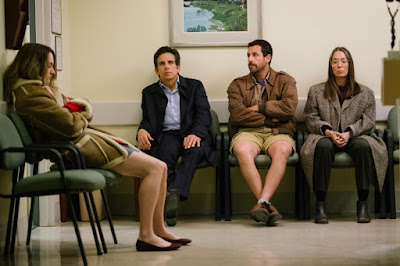 |
| Image courtesy of Netflix. |
The film is broken into chapters devoted to various characters in the dysfunctional, but mostly artistically inclined, Meyerowitz clan. Baumbach also frequently cuts away from an actor in mid-speech - or often, shout - and this has the effect of notifying the audience that its characters are people who talk at each other, without often truly listening to what their fellow family members are saying. In other words, they often don't feel listened to or appreciated.
The paterfamilias of the Meyerowitz family is Harold (Dustin Hoffman), a self-important artist whose sculpture work is barely remembered as part of a movement from the late 1960s. Harold is bitter that some of his contemporaries, such as pal L.J. (Judd Hirsch, in a great cameo appearance), are more respected and he pretends to not be interested in a gallery exhibit offered to him, mostly because he'll have to share it with other artists - although we all know he'll accept in the end. Harold is constantly put upon and there's a truly hilarious sequence during which he nearly has a meltdown after a person seated next to him at a restaurant just slightly invades his space. Harold bears some resemblance to Jeff Daniels' hysterically self-involved character from Baumbach's "The Squid and the Whale."
Harold's two sons - Danny (Adam Sandler) and his half-brother, Matthew (Ben Stiller) - are both screwed up in their own ways. Danny is a good father to his daughter, Eliza (Grace Van Patten), although we first meet him singing along to Lisa Lisa and Cult Jam in the car with the girl and nearly having his own meltdown while attempting to park in Manhattan. Danny and Eliza's mother, who is never seen, are separating and he is currently unemployed - after being a stay-at-home father and piano teacher - and seeking a temporary stint on Harold's couch.
Meanwhile, Matthew is the most successful member of the family - albeit, the only one with no artistic ability or temperament - and lives in Los Angeles, where he has recently started a new real estate firm. He resents Harold, who it appears to have constantly made Matthew feel as if the two of them were competing, and there is tension when the two are in the same room together.
However, after Harold ends up in the hospital, his two sons and daughter, Jean (Elizabeth Marvel, who gets some of the film's best lines) reunite. Harold's constantly drunken third wife, Maureen (Emma Thompson, showing a gift for comedy that I'd never before imagined), isn't much help, so it's up to Harold's children to take care of things.
As I'd mentioned before, not much new happens here that hasn't already been witnessed in numerous other movies about dysfunctional families with self-centered patriarchs. But the writing here is so sharp - much like Baumbach's other films - and the performances are incredibly genuine. Hoffman and Thompson are both irritatingly funny, while Marvel is more touchingly so. And Stiller has some great moments, most notably a scene during which he has to pay tribute to his father at Harold's gallery exhibit.
But it's Sandler who turns in the strongest performance here, easily his best since his surprise turn in Paul Thomas Anderson's "Punch Drunk Love" 15 years ago. Yes, the actor occasionally goes into the rage mode he's known for in his films about men with stunted, juvenile personalities, but here - much like in Anderson's film - this is utilized to maximum capacity. He also shows a vulnerability that might convince those who wrote him off long ago. It's a genuinely convincing performance.
Baumbach's films can be described as slightly more acerbic pictures in the vein of Woody Allen. His characters are just as intellectual as Allen's - and they'll often rub it in one another's faces - but they are also more fragile, despite their often hardened exteriors. The director is also a great writer, as witnessed by films such as "The Squid and the Whale," "Greenberg," "While We're Young" and "Frances Ha." I'm not sure if "The Meyerowitz Stories" is among his very best, but it's very good nevertheless - engrossing, funny, humane and wonderfully acted.
No comments:
Post a Comment